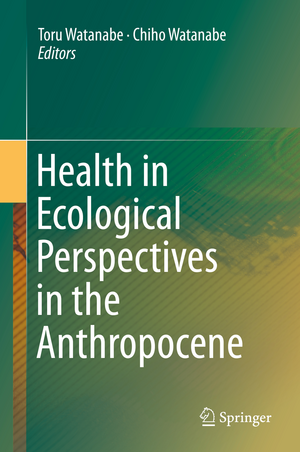Health in Ecological Perspectives in the Anthropocene
Editat de Toru Watanabe, Chiho Watanabeen Limba Engleză Hardback – 10 dec 2018
The post-2015 UN agenda has just put forward, and tremendous efforts have been started to develop and establish appropriate indicators to achieve the SDG goals. This book will also serve as a useful guide for creating such an indicator associated with health and planning, in line with the Ecohealth concept, the major tone of this book. With the increasing and pressing needs for adaptation to climate change, as well as societal change, this would be a very timely publication in this trans-disciplinary field.
Preț: 715.55 lei
Preț vechi: 753.22 lei
-5% Nou
Puncte Express: 1073
Preț estimativ în valută:
136.92€ • 143.32$ • 113.96£
136.92€ • 143.32$ • 113.96£
Carte tipărită la comandă
Livrare economică 31 martie-14 aprilie
Preluare comenzi: 021 569.72.76
Specificații
ISBN-13: 9789811325250
ISBN-10: 9811325251
Pagini: 155
Ilustrații: VI, 159 p. 34 illus., 21 illus. in color.
Dimensiuni: 155 x 235 mm
Greutate: 0.41 kg
Ediția:1st ed. 2019
Editura: Springer Nature Singapore
Colecția Springer
Locul publicării:Singapore, Singapore
ISBN-10: 9811325251
Pagini: 155
Ilustrații: VI, 159 p. 34 illus., 21 illus. in color.
Dimensiuni: 155 x 235 mm
Greutate: 0.41 kg
Ediția:1st ed. 2019
Editura: Springer Nature Singapore
Colecția Springer
Locul publicării:Singapore, Singapore
Cuprins
Chapter 1: Ecohealth and human ecology as underlying theoretical background.- Chapter 2: Health impact of urban physicochemical environment considering the mobility of the people.- Chapter 3: Population mobility modeling based on call detail records of mobile phones for heat exposure assessment in Dhaka, Bangladesh.- Chapter 4: Air pollution and children’s health: Living in urban areas in developing countries.- Chapter 5: Statistical Analysis on Geographical Condition of Malaria Endemic area: A Case of Laos Savannakhet Province.- Chapter 6: Ecohealth Approach to Longevity Challenges in Anthropocene: A Case of Japan.- Chapter 7: Importance of appropriate and reliable population data in developing regions to understand epidemiology of diseases.- Chapter 8: Access to health care in Sub-Saharan Africa: challenges in a changing health landscape in a context of development.- Chapter 9: Health risk assessment for planning of a resilient city in the changing regional environment.- Chapter 10:An Ecological Context towards Understanding Dengue Disease Dynamics in Urban Cities: A Case Study in Metropolitan Manila, Philippines.- Chapter 11: Floods and foods as potential carriers of disease between urban and rural areas.- Chapter 12: Flood and Infectious Disease Risk Assessment.
Notă biografică
Editors:
Toru Watanabe, Department of Food, Life and Environmental Science, Faculty of Agriculture, Yamagata University, Yamagata, Japan
Chiho Watanabe, National Institute for Environmental Studies, Tsukuba, Japan
Textul de pe ultima copertă
This book focuses on the emerging health issues due to climate change, particularly emphasizing the situation in developing countries. Thanks to recent development in the areas of remote sensing, GIS technology, and downscale modeling of climate, it has now become possible to depict and predict the relationship between environmental factors and health-related event data with a meaningful spatial and temporal scale. The chapters address new aspects of environment-health relationship relevant to this smaller scale analyses, including how considering people’s mobility changes the exposure profile to certain environmental factors, how considering behavioral characteristics is important in predicting diarrhea risks after urban flood, and how small-scale land use patterns will affect the risk of infection by certain parasites, and subtle topography of the land profile. Through the combination of reviews and case studies, the reader would be able to learn how the issues of health and climate/social changes can be addressed using available technology and datasets.
The post-2015 UN agenda has just put forward, and tremendous efforts have been started to develop and establish appropriate indicators to achieve the SDG goals. This book will also serve as a useful guide for creating such an indicator associated with health and planning, in line with the Ecohealth concept, the major tone of this book. With the increasing and pressing needs for adaptation to climate change, as well as societal change, this would be a very timely publication in this trans-disciplinary field.
The post-2015 UN agenda has just put forward, and tremendous efforts have been started to develop and establish appropriate indicators to achieve the SDG goals. This book will also serve as a useful guide for creating such an indicator associated with health and planning, in line with the Ecohealth concept, the major tone of this book. With the increasing and pressing needs for adaptation to climate change, as well as societal change, this would be a very timely publication in this trans-disciplinary field.
Caracteristici
Serves as a guidebook for ecohealth-based approach to the various issues of environmental health Provides analyses on extensive and detailed field data on Southeast and South Asian regions where available data is scarce Focuses on the single topic with distinctly different approaches, including urban environmental engineering and health risk assessment, providing various and more comprehensive viewpoints
